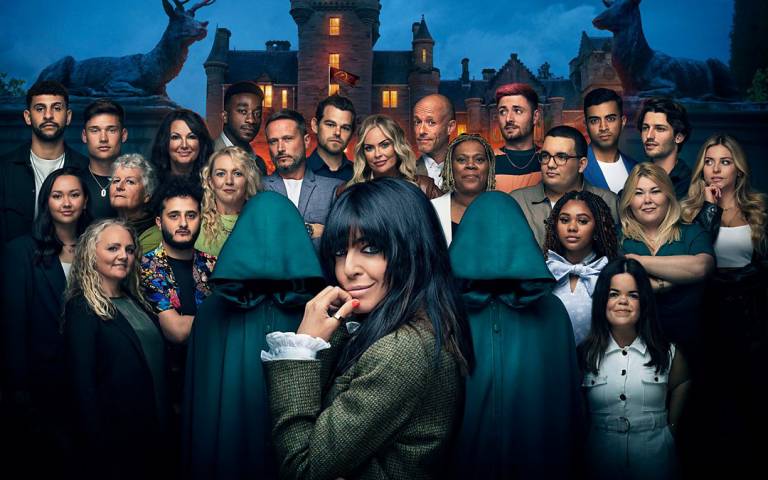Group exercise top tips...from BBC1’s The Traitors
SPOILER ALERT: In addition to fabulous careers advice, this article will tell you whether traitors or faithfuls won the dosh. Written by Dr Sophia Donaldson.

30 January 2023
Photograph: BBC
Given the number of posts we’ve dedicated to Love Island over the years, you’d be forgiven for thinking it’s the only reality show that matters to us here at UCL Careers. But you’d be very wrong. I spent my winter break binge-watching The Traitors, and, as is always the case with my festive viewing, I couldn’t help but notice Claudia Winkleman and co. sharing some pretty important career lessons. Appropriately enough for a format in which 22 strangers endure a variety of wacky tasks to compete for a grand prize, these lessons seemed to be geared towards optimising group exercise performance at assessment centres.
You probably picked them up yourselves already, but as group exercises can be an especially daunting interview format for candidates, I thought I’d remind you of the top three:
- The task is not always the task
When Traitors contestants were tied to a giant wheel, suspended upside down, and awarded titles like Most Trustworthy and Biggest Fake, I’m sure we were all thinking the same thing: classic interview. The task was ostensibly for those on the wheel to correctly guess what fellow contestants would say about them, and if they did, the group earned money. But the activity served a double function, providing insights into the group’s thinking, so traitors could decide who to ‘murder’.
The same is true in certain interviews (without the murder bit), especially in the group exercises you may face when applying to large employers’ graduate schemes. Your group will be given a task, and of course, ideally the group will produce an excellent output. However, another even more crucial element is your behaviour within the group, which will be assessed throughout. If you focus too much on the output at the expense of group cohesion and inclusion, and even basic manners, you’re unlikely to make it to the next round.
This logic also applies to individual case study and brainteaser questions you might face when applying to city roles. Although it would be fabulous if you could correctly state, for example, the exact number of toothbrushes sold last year in the US, that’s not really what an interviewer’s after. Yes, they want to see your estimate isn’t wildly off, so a bit of general knowledge and common sense will help, but they’re primarily assessing your ability to stay calm under pressure and logically work through a problem, so make sure you display those skills just as clearly as you do the final answer.
- Not everyone is a foe
Wilf, Wilf, Wilf. He came so close to winning he could almost taste the gold, but it was snatched away from him at the last minute by the faithfuls. Perhaps it was inevitable, but perhaps it was because by stabbing Amanda and Kieran in the back, Wilf was too much of a traitor for his own good. Maybe there are alternate universes where Wilf went home victorious, splitting the spoils with his fellow traitors, because he chose to be a good ally, not a lone Wilf.
Group exercise interviews are very similar. You’re made to work side-by-side with people who are essentially your competition. But as you’re being assessed on your teamworking behaviour, becoming too competitive would be a mistake. It’s good to remember that in large recruitment processes, just as in Traitors, there can usually be more than one winner. It’s quite possible everyone in a high-performing team can make it through to the next recruitment round, and it’s equally possible that no one in a poorly-performing team might be taken forward. Try to keep that in mind during group exercises, and create allies rather than enemies.
- Say something
Alyssa was the first traitor to be ousted from the castle. The reason? Well, apart from Wilf throwing her under the bus, her quiet nature made the faithfuls suspicious.
Saying very little is also a sure-fire way to fail a group interview. Of course, being domineering and talking over people isn’t the answer. That too is unlikely to see you progress. But if you don’t contribute in some way, it will be difficult for assessors to see how you helped with the outcome.
Patterns within a group can be set up early, so as a general rule, try to speak up within the first 90 seconds of the task. That doesn’t mean you have to generate a grand idea. Maybe you could be coordinating introductions, recapping/defining the task, sharing your thoughts on someone else’s input, inviting quieter members to offer their opinions, or setting up a plan for how to spend the allotted time. In fact, ensuring the team stays on task and to time is a really useful function to take within a group exercise, and doesn’t rely on you being struck by sudden inspiration.
 Close
Close

